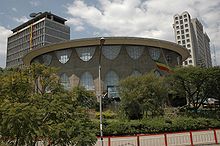Economy of Ethiopia

|
|
| Currency | Birr (ETB) (ብር) |
|---|---|
| 8 – 7 July (1 ሐምሌ – 30 ሰኔ) | |
|
Trade organisations
|
AU, WTO (observer) |
| Statistics | |
| GDP | $170.4 billion (PPP) $67.43 billion (nominal) (IMF, 2016 est.[update]) |
| GDP rank | 70th (nominal) / 70th (PPP) |
|
GDP growth
|
|
|
GDP per capita
|
$1,869 (PPP) $739.4 (nominal) (IMF, 2016 est.[update]) |
|
GDP by sector
|
agriculture (40.5%), services (43.3%), industry (16.2%) (2015[update]) |
|
|
|
|
Population below poverty line
|
29.6% living below $1.90/day (2014[update]) |
|
|
|
|
Labour force
|
49.27 million (13th (2015[update]) |
| Unemployment | 24.9% |
|
Main industries
|
food processing, beverages, textiles, leather, chemicals, metals processing, cement |
|
|
|
| External | |
| Exports | $3.163 billion (2015[update]) |
|
Export goods
|
coffee, qat, gold, leather products, live animals, oilseeds |
|
Main export partners
|
|
| Imports | $15.87 billion (2015[update]) |
|
Import goods
|
machinery and aircraft, metal and metal products, electrical materials, petroleum products, motor vehicles, chemicals and fertilizers |
|
Main import partners
|
|
|
Gross external debt
|
|
| Public finances | |
| 48.6% of GDP (2015[update]) | |
| Revenues | $9.26 billion (2015[update]) |
| Expenses | $10.7 billion(2015[update]) |
| Economic aid | $308 million (recipient) (2001[update]) |
|
Economist Intelligence Unit: CCC (Sovereign risk) CCC (Currency risk) CCC (Commercial Bank of Ethiopia) CC (Political risk) CCC (Economic structure risk) CCC (Country risk) (February 2014) |
|
|
Foreign reserves
|
$3.113 billion (2015[update]) |
The economy of Ethiopia is a mixed and transition economy with a large public sector. Ethiopian government is in the process of privatizing many of the state-owned businesses and moving toward a market economy. However, the banking, telecommunication and transportation sectors of the economy are dominated by government-owned companies.
Ethiopia has one of the fastest-growing economies in the world and is Africa’s second most populous country. Many properties owned by the government during the previous regime have now been privatized and are in the process of privatization. However, certain sectors such as telecommunications, financial and insurance services, air and land transportation services, and retail, are considered as strategic sectors and are expected to remain under state control for the foreseeable future. Almost 50% of Ethiopia's population is under the age of 18, and even though education enrollment at primary and tertiary level has increased significantly, job creation has not caught up with the increased output from educational institutes. The country must create hundreds of thousands of jobs every year just to keep up with population growth.
The Ethiopian constitution defines the right to own land as belonging only to "the state and the people", but citizens may only lease land (up to 99 years), and are unable to mortgage, sell, or own it. Various groups and political parties have sought for full privatization of land, while other opposition parties are against privatization and favor communal ownership.
The current government has embarked on a program of economic reform, including privatization of state enterprises and rationalization of government regulation. While the process is still ongoing, the reforms have begun to attract much-needed foreign investment. Despite recent improvements, Ethiopia remains one of the poorest nations in the world.
...
Wikipedia
